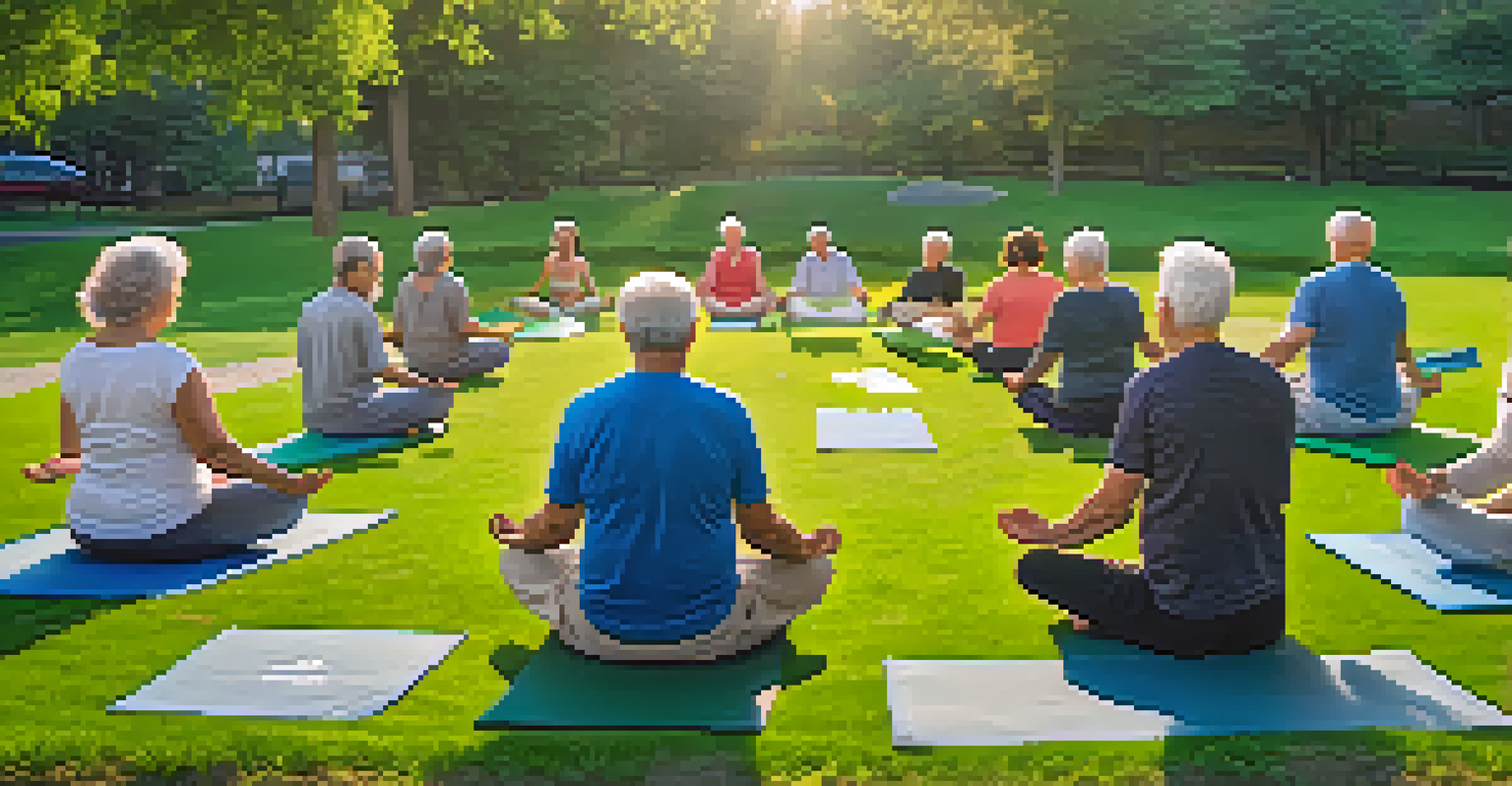Preventive Care Strategies for Senior Health

Understanding Preventive Care for Seniors
Preventive care focuses on maintaining health and preventing diseases before they occur. For seniors, this approach is crucial because age often brings a higher risk of chronic conditions. By engaging in preventive health strategies, older adults can enhance their quality of life and maintain independence.
An ounce of prevention is worth a pound of cure.
Examples of preventive care include regular check-ups, vaccinations, and screenings for diseases like diabetes and cancer. These practices help catch potential health issues early when they are more manageable. Understanding these elements can empower seniors to take charge of their health.
Moreover, preventive care is not just about medical appointments. It encompasses a holistic view of health that includes mental and emotional well-being, nutrition, and physical activity. This multifaceted approach ensures seniors have a comprehensive plan for their health.
Regular Health Screenings: A Must for Seniors
Regular health screenings are an integral part of preventive care for seniors. These screenings can identify potential health issues early, which is often key in effective treatment. Conditions such as high blood pressure, cholesterol levels, and certain cancers can be mitigated with timely checks.

For example, a simple blood test can reveal high cholesterol, prompting dietary changes or medication to avoid heart disease. Similarly, routine mammograms or colonoscopies can catch cancers at stages where they are more treatable. This proactive approach is vital as it leads to better outcomes.
Preventive Care Enhances Senior Health
Engaging in preventive care strategies empowers seniors to maintain their health and independence.
Seniors should have a clear schedule for their screenings, tailored to their personal health history and risk factors. Collaborating with healthcare providers to create a customized plan ensures that no important tests are overlooked.
Vaccinations: Protecting Against Common Illnesses
Vaccinations are a cornerstone of preventive care, especially for seniors. As we age, our immune systems may weaken, making us more susceptible to illnesses like influenza and pneumonia. Staying up-to-date with vaccinations can significantly reduce these risks and prevent serious complications.
The greatest wealth is health.
For instance, the flu shot is recommended annually for older adults to help protect against seasonal outbreaks. Similarly, the pneumonia vaccine can shield seniors from a disease that can be particularly severe. These preventive measures can ultimately save lives and reduce hospital visits.
Seniors should consult with their healthcare providers to ensure they receive the appropriate vaccines based on their health status and lifestyle. This proactive step is an easy yet effective way to safeguard health.
Nutrition: Fueling Senior Health with Balanced Diet
A balanced and nutritious diet is vital in preventive care for seniors. As metabolism slows with age, it becomes essential to focus on nutrient-dense foods that promote health without excess calories. Incorporating fruits, vegetables, whole grains, and lean proteins can support overall well-being.
For example, foods rich in omega-3 fatty acids, like salmon, can benefit heart health, while calcium and vitamin D from dairy products strengthen bones. Seniors should also be mindful of hydration, as thirst perception may decrease with age. Staying hydrated aids in digestion and maintains energy levels.
Regular Screenings are Essential
Timely health screenings can identify potential issues early, leading to better treatment outcomes for seniors.
Creating a meal plan that emphasizes variety and moderation can help seniors meet their nutritional needs. Engaging in cooking classes or seeking advice from a nutritionist can further enhance their dietary habits.
Physical Activity: Staying Active for Longevity
Regular physical activity is a vital preventive strategy for seniors. It helps maintain muscle strength, flexibility, and balance, reducing the risk of falls and injuries. Even moderate activities like walking, swimming, or yoga can yield significant health benefits.
For instance, participating in a local walking group not only promotes physical health but also provides social interaction, which is equally important for mental well-being. Exercise releases endorphins, known as 'feel-good' hormones, which can improve mood and reduce feelings of isolation.
Creating a routine that incorporates enjoyable activities can make staying active easier. Whether it's gardening, dancing, or playing a sport, finding joy in movement encourages consistency and ultimately enhances health.
Mental Health: Prioritizing Emotional Well-Being
Mental health is a crucial aspect of preventive care that often gets overlooked. Seniors may face various stressors, including loneliness, loss, or health challenges, making it essential to prioritize emotional well-being. Regular mental health check-ins can help identify any issues early.
Activities like meditation, journaling, or engaging in hobbies can foster a positive mindset. Moreover, socializing with friends and family, or participating in community events, can alleviate feelings of isolation and promote happiness. It's important for seniors to nurture their mental health just as they would their physical health.
Support Systems Improve Well-Being
A strong support system, including family and community resources, is crucial for enhancing emotional and practical support for seniors.
Seniors should not hesitate to seek professional help if they feel overwhelmed. Therapists or counselors can provide valuable support and coping strategies, helping to maintain a balanced mental state.
Building a Support System: Community and Care
A strong support system is invaluable in preventive care for seniors. This network can include family, friends, and community resources that provide emotional and practical assistance. Knowing that help is available can alleviate stress and improve overall well-being.
For example, local senior centers often offer programs and activities that encourage social interaction and physical activity. These environments foster connections and create a sense of belonging, both of which are vital for mental health. Additionally, family members can assist in navigating healthcare decisions, ensuring that seniors receive the appropriate care.

Encouraging open communication within this support system is essential. Regular check-ins and shared activities can strengthen relationships and promote a collaborative approach to maintaining health.